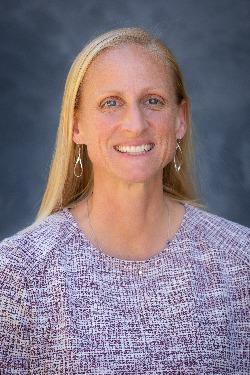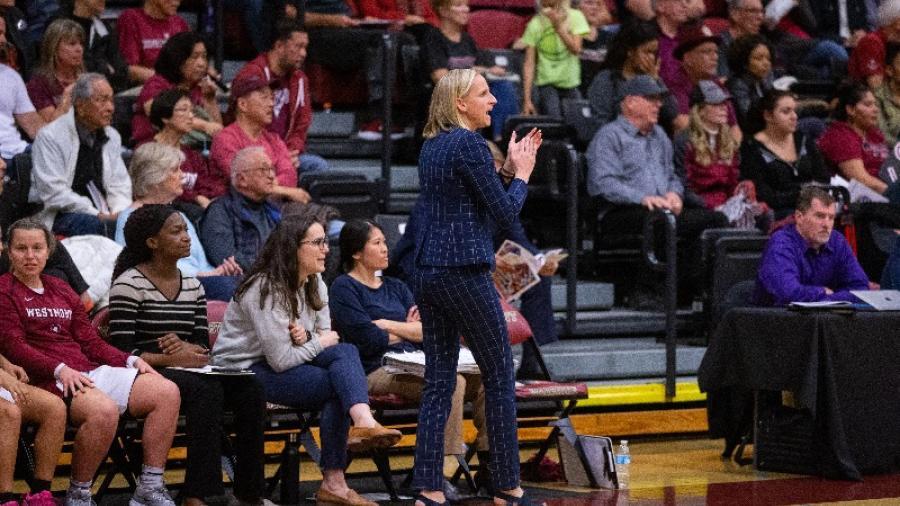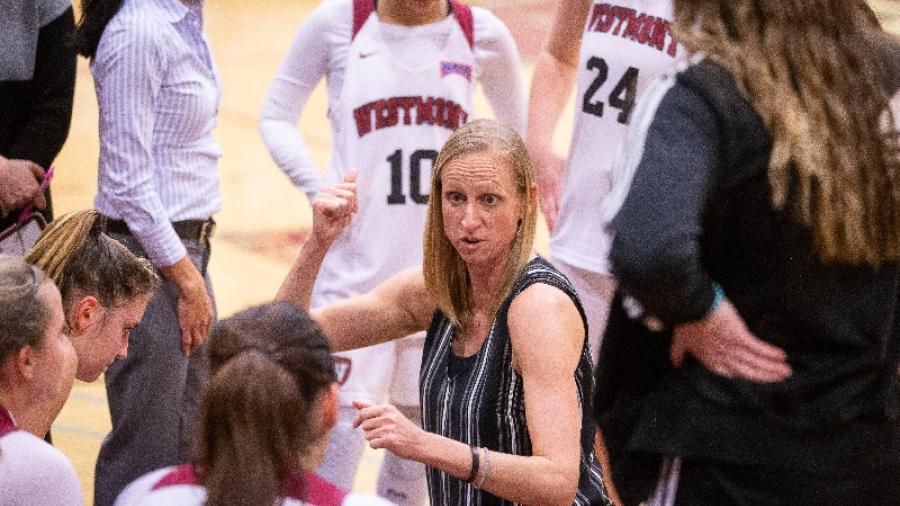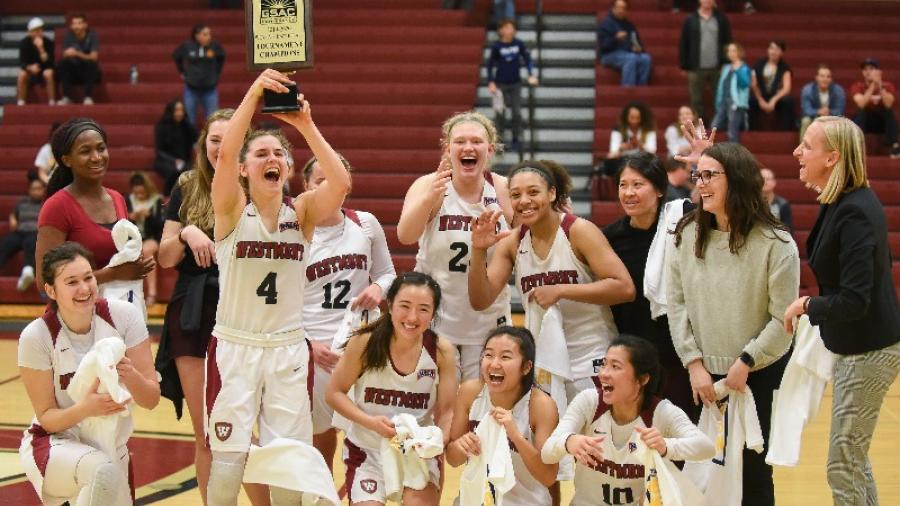Resilient Leadership

USING ADVERSITY TO BRING OUT OUR BEST IN LEADERSHIP AND IN LIFE
Kirsten Moore, Head Coach of the Westmont Women’s Basketball Team and Associate Athletic Director
What a year 2020 has been for us all. On March 12, the day after the Westmont women’s basketball team received our first-ever No. 1 overall seed for the NAIA National Tournament, we learned that the tournament was being cancelled due to COVID-19. I believe that was the right thing for the NAIA to do, although it didn’t make it any easier to look my team in the eyes and tell them that despite the immeasurable amount of work and emotion they invested in their goals, their season had just come to an abrupt end.
We’ve faced challenges on many fronts, mostly unrelated to basketball, since that day. As I’ve navigated the spectrum of emotions that come with adversity and sought to lead, I’ve challenged myself and my team to focus on HOPE. In fact, the times our Westmont women’s basketball program has faced the most adversity have been the years we experienced our greatest success—and most importantly the occasions we grew in lasting ways beyond the basketball court.
In 2013, after my husband unexpectedly passed away, we won the National Championship. In 2018 after the Thomas Fire and Montecito Debris Flow led to repeated evacuations in the middle of our season, we remarkably made it all the way to the National Championship Game. And last season, after a number of players were sidelined for health reasons, we competed most of our games with eight semi-healthy players who averaged5’5” in height and amazingly finished the season ranked No. 1 in the nation. I’ve led the team as head coach for 15 years, and in the three seasons our program endured the most adversity we finished with the highest results.
One of my favorite quotes comes from Tony Bennett, the men’s basketball coach at the University of Virginia, who said, “If you learn to use it right, the adversity, it will buy you a ticket to a place you could not have gone any other way.”
Notice that Coach Bennett says, “If you learn to use it right.” Adversity certainly doesn’t guarantee that our best comes out. We have an important choice in how we respond in the face of adversity that puts us in a position to rise. Here are four practical points that I have learned to use and teach my players as I lead them in the midst of adversity. I believe they create the environment for extraordinary growth.
REMEMBER
The theme of remembering occurs repeatedly in the Bible for a good reason. I resonate with Lamentations 3:21-24, which states that remembering the faithfulness of God produces HOPE in us. When I remember the ways God has been faithful in past trials, I gain confidence that victory through my current circumstances is also possible. I also choose to remember God’s promises found in Scripture as so many give us hope. For example, Romans 8:28 tells us that God will work all things (even the bad things) together for the good of those who love him. This grounding in hope provides the rich soil required for growth. As a leader, I strive to remember God’s faithfulness.
THE LITTLE THINGS MAKE THE BIG THINGS HAPPEN
I probably repeat this phrase to my team more than any other. I believe it to be true in both basketball and life, but especially in trials when the big picture seems overwhelming. We actually achieve big accomplishments through a series of step-by-step actions and decisions. When you string enough little victories together, then the remarkably big victories become possible. Ask yourself, “What can I do right now, in this moment, that will take me one step closer to becoming my best?” Then moment by moment, step by step, you overcome. The big external success people see in our seasons of adversity have come from challenging, motivating and empowering my team to be their best just one day at a time.
CONTROL THE CONTROLLABLES
So many things lie outside of our control. In the midst of 2020, that truth has become more palpable than ever. Trying to control the uncontrollable only leads to increased stress and hopelessness. However, we can control three things regardless of our circumstances: our attitude, our effort and our choice to love others. While we often can’t control the fact that adversity exists, we can control our response to it, and our attitude sets the course for our response. A hopeful attitude is the foundation we need to work relentlessly each day to make the most of whatever we can control in our circumstances. We can also choose to act in love toward one another. One of our greatest gifts is the ability to encourage one another and spur one another on toward love and good deeds. We need this more than ever in 2020 in our homes, our communities, our nation and our world. We especially need it in our leaders.
GRATITUDE IS THE KEY THAT UNLOCKS RESILIENCY
One of the biggest buzzwords in education today is “grit.” Specifically, how do we help individuals develop the resiliency to persevere toward long-term goals regardless of the challenges they may face? On a more personal level, how do I stay resilient in hard times and continue leading effectively? As I look back on the hardest trials of my life, the difference between the days I progressed and the days I struggled most hinged on my ability to choose gratitude. That doesn’t mean the painful or hard circumstances go away, but it reframes our perspective and gives us the ability to see beyond the trial. A grateful spirit provides the fuel that keeps us pressing on towards the goal and being able to lead in the midst of great difficulties.
Remembering the way our 2013, 2018 and 2020 women’s basketball seasons stretched us to become our best selves gives me hope that IF we learn to use it right, our current trials will also stretch us to grow and possibly even buy us a ticket to a place we couldn’t have gone any other way.
LEADERS TAKE INITIATIVE
Naomi Siragusa ’24
Angela Tran ’24
Taking initiative is important for turning goals into reality. Experiencing quarantine ourselves allowed us to consider the needs of quarantined students. In response to this insight, we created the Quarantine Hospitality Team to meet those needs. Our purpose for this team is to show Jesus’ love to others and be servant leaders. Our goal is that each individual would feel our hospitality and know that we’re saying, “We love you, we care about you, and we’re here for you during this time.” When we started the Quarantine Hospitality Team, the first thing we did was ask Residence Life staff how we could move forward with our desire to serve those in quarantine. This is an example of taking the first step to achieve a goal requiring leadership through times of adversity, challenge and trial.
WITH A LITTLE HELP FROM MY FRIENDS
Jason Tavarez, Director of Institutional
Resilience
During times of strife and uncertainty, I like to think I lead with a sense of calm rationality informed by facts, never forgetting that every decision I make affects people.
One of my biggest adaptations in my life pertains to flexibility. In July, the possibility of bringing students back to campus seemed doubtful. I would have laughed if anyone predicted students in classrooms on campus or athletes training in pods to prepare for competitions in the fall. This pandemic has taught me to be ready to “pivot” (not my favorite word!) quickly and humbly. Working in risk and emergency management involves appropriate planning, but life is often far more complicated than that.
These challenging times have encouraged me to ask for help when I need it and to be unafraid to admit my concerns. By nature, I’m a people-pleaser and an optimist; I want people to like me and think of me as competent and capable. I’ve learned that to be as effective as possible, I have to accept help. I’ve become willing to admit I don’t know everything and that sometimes I feel scared. None of us knows what the future holds; we simply do the best we can with the cards we’ve been dealt.
Since coming to Westmont in February and taking over for Troy Harris, I’ve tried to maintain the excellent customer service the community expects from this office thanks to Troy’s impeccable record and unimpeachable character. While Troy is a wizard in some things, I’ve tried to learn an entirely new set of skills to make life on campus easier while also saving money. Additionally, I seek to provide a safe space for people to share their concerns about the uncertainty of life. Sometimes people just need to talk and have someone listen, and I always hope people will turn to me and Institutional Resilience for support, encouragement and understanding.
TAKING TIME TO PRAY AND REACH OUT
Sonya Welch, Coordinator of Academic
Support Services
As news of the pandemic reached the world and the chain of information trickled to our community, we were forced to recognize the changes to our everyday routines. With the daily hustling being stripped away, we’ve had time to do more meaningful things.
Shifting to working at home has given me the opportunity to go for walks in the morning and in the evenings. I’ve taken this time to lift up friends and family in prayer. These quiet walks have allowed me to reflect on God’s faithfulness.
Besides spending time outside, finding ways to continue building relationships has been important to me. We have a lot of widows in our church, and it’s been fun sending cards to them to let them know we’re thinking of and praying for them. Some have responded with prayer requests and needs we can help them with. Through their writing, I’m learning more about them and understanding what’s important to them.
They’ve shared their struggles and loneliness, yet their prayer requests are always for others. I look forward to getting updates from them. God continues to show his faithfulness.
MOVING ON FROM ACCEPTANCE TO ACTION
Dominique Loftus ’15,
Marketing and Events Promotion Manager
Leading during challenging times has meant practicing acceptance. The ever-shifting situation of COVID-19 has presented many challenges to our admissions team in our endeavors to recruit students. We’ve experienced moments of frustration and disappointment and seemingly endless setbacks.
At such times, my mom is always the first person I call. She listens empathetically, but has always reminded me there’s no use complaining or getting upset at the hand life has dealt you. All you can do is accept the moment you find yourself in and start looking toward what comes next.
Once you accept it, your mind starts to shift away from lament toward action. What creative solutions can you discover? What perspective can help shift your attitude? How will you develop a new plan to move forward?
Leading our marketing and events department has meant being solution-oriented, shifting the focus outside of ourselves to others who may need the help, and finding small victories along the way. I’ve been incredibly blessed to be a part of such a resilient team here at Westmont. Our marketing and communications team, admissions counselors, data team and the entire Westmont community have worked around the clock to keep Westmont moving forward.



